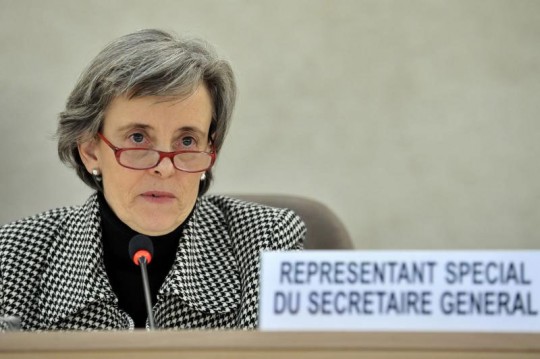UN envoy welcomes new measure to stop violence against children
UN envoy welcomes new measure to stop violence against children
 Special Representative on Violence against Children Marta Santos Pais. UN Photo/Jean-Marc Ferre
Special Representative on Violence against Children Marta Santos Pais. UN Photo/Jean-Marc Ferre
A United Nations envoy dealing with children’s rights today hailed the decision of Member States to adopt a new protocol aimed at protecting children from abuse and violence.
The new protocol to the Convention on the Rights of the Child, adopted today by the General Assembly, will encourage State parties to develop national mechanisms enabling children whose rights have been violated to access a system through which their voices and complaints can be heard.
The protocol will enter into force three months after it acquires ratifications or accessions from 10 countries.
“I wholeheartedly welcome the historical adoption of this protocol which consolidates the international system of accountability for human rights and is of decisive relevance to children’s protection from violence,” said Marta Santos Pais, the Special Representative of the Secretary-General on Violence against Children.
I am confident the adoption of the protocol will be followed by a swift process of ratification and its provisions will help bring to an end the invisibility and conspiracy of silence surrounding incidents of violence against children.
“I am confident the adoption of the protocol will be followed by a swift process of ratification and its provisions will help bring to an end the invisibility and conspiracy of silence surrounding incidents of violence against children,” Ms. Pais added.
The new protocol is the third one to the Convention and joins the Optional Protocols on the Sale of Children, Child Prostitution and Child Pornography and on the involvement of Children in Armed Conflict – both of which entered into force in 2002.
Established in 1989, the Convention on the Rights of the Child is the first legally binding international instrument incorporating the full range of human rights – civil, cultural, economic, political and social – for people under the age of 18.
###
> United Nations (UN).
 The United Nations was established on 24 October 1945 by 51 countries committed to preserving peace through international cooperation and collective security. Today, nearly every nation in the world belongs to the UN: membership totals 192 countries.
The United Nations was established on 24 October 1945 by 51 countries committed to preserving peace through international cooperation and collective security. Today, nearly every nation in the world belongs to the UN: membership totals 192 countries.
When States become Members of the United Nations, they agree to accept the obligations of the UN Charter, an international treaty that sets out basic principles of international relations. According to the Charter, the UN has four purposes:
- to maintain international peace and security;
- to develop friendly relations among nations;
- to cooperate in solving international problems and in promoting respect for human rights;
- and to be a centre for harmonizing the actions of nations.
###
* The above story is adapted from materials provided by United Nations (UN)
** More information at United Nations (UN)




















